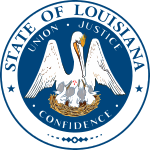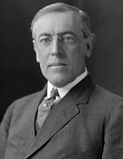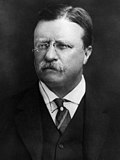| |||||||||||||||||||||||||||||||||
| |||||||||||||||||||||||||||||||||
 Parish Results
Wilson 50-60% 60-70% 70-80% 80-90% 90-100%
| |||||||||||||||||||||||||||||||||
| |||||||||||||||||||||||||||||||||
| Elections in Louisiana |
|---|
 |
|
|
The 1912 United States presidential election in Louisiana took place on November 5, 1912, as part of the 1912 United States presidential election. State voters chose ten representatives, or electors, to the Electoral College, who voted for president and vice president.
Following the passage of a new constitution in 1898, Louisiana became a one-party state dominated by the Democratic Party. The Republican Party became moribund due to the disenfranchisement of blacks and the complete absence of other support bases as Louisiana completely lacked upland or German refugee whites opposed to secession.[1] Despite this absolute single-party dominance, non-partisan tendencies remained strong among wealthy sugar planters in Acadiana, within the business elite of New Orleans,[2] and even amongst the “lily-white” faction of the moribund state GOP that had supported black disenfranchisement in the effort to become respectable amongst the white elite.[3]
Following disfranchisement, the state’s politics became dominated by the Choctaw Club of Louisiana, generally called the “Old Regulars”. This political machine was based in New Orleans and united with Black Belt cotton planters.[4] The first significant opposition would not emerge until 1908, when the Socialist Party elected several officials in Winn Parish,[5] and this would be joined in the early 1910s by the growth of the Industrial Workers of the World in the lumbering parishes of Imperial Calcasieu.[6]
Louisiana was won by Princeton University President Woodrow Wilson (D–Virginia), running with governor of Indiana Thomas R. Marshall, with 76.81% of the popular vote, against the 26th president of the United States Theodore Roosevelt (P–New York), running with governor of California Hiram Johnson, with 11.71% of the popular vote and the five-time candidate of the Socialist Party of America for President of the United States Eugene V. Debs (S–Indiana), running with the first Socialist mayor of a major city in the United States Emil Seidel, with 13.33% of the popular vote.[7]
Louisiana was one of the states where the sitting president William Howard Taft came in fourth place. Debs would take advantage of the growth of the Socialist Party in the hill country and Imperial Calcasieu to gain over twenty percent of the vote in five parishes, with Winn Parish — the home of Louisiana’s future Long dynasty — being his third-best county-equivalent in the nation,[8] although this radical opposition would become mortally weakened almost immediately afterwards by the unresolved conflict between electoral and antipolitical strategies for reform.[9] Louisiana and neighboring Mississippi were the only two states that voted more Republican than they did in 1908.
- ^ Phillips, Kevin P. (November 23, 2014). The Emerging Republican Majority. Princeton University Press. pp. 208, 210. ISBN 9780691163246.
- ^ Schott, Matthew J. (Summer 1979). "Progressives against Democracy: Electoral Reform in Louisiana, 1894-1921". Louisiana History: The Journal of the Louisiana Historical Association. 20 (3): 247–260.
- ^ Heersink, Boris; Jenkins, Jeffrey A. (March 19, 2020). Republican Party Politics and the American South, 1865-1968. Cambridge University Press. pp. 265–266. ISBN 978-1107158436.
- ^ Wall, Bennett H.; Rodriguez, John C. (January 28, 2014). Louisiana: A History. John Wiley & Sons. pp. 274–275. ISBN 978-1118619292.
- ^ Williams, Thomas Harry (1981). Huey Long. New York City: Vintage Books. pp. 44–45. ISBN 0394747909.
- ^ Renshaw, Patrick (1968). The Wobblies: The Story of Syndicalism in the United States. Garden City, New York: Anchor Books. pp. 76, 120–121.
- ^ "1912 Presidential Election Results — Louisiana". Dave Leip’s U.S. Election Atlas.
- ^ "1912 Presidential Election Statistics". Dave Leip’s U.S. Election Atlas.
- ^ Renshaw (1968). The Wobblies, pp. 122-123



